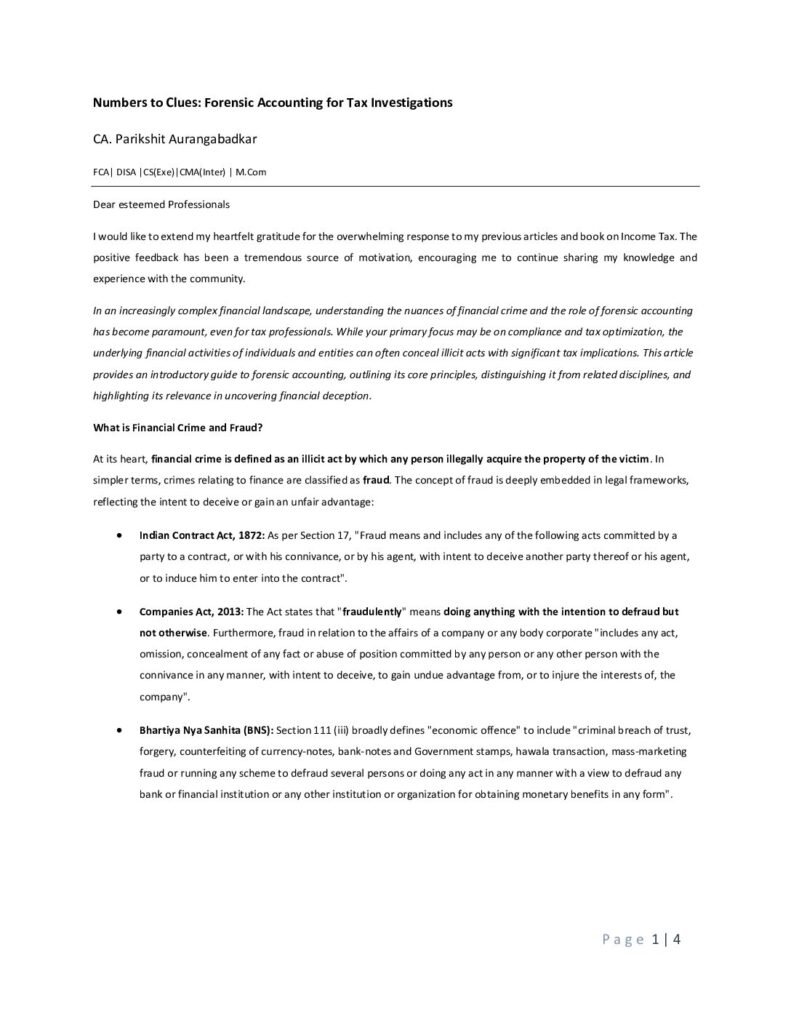In an increasingly complex financial landscape, understanding the nuances of financial crime and the role of forensic accounting has become paramount, even for tax professionals. While your primary focus may be on compliance and tax optimization, the underlying financial activities of individuals and entities can often conceal illicit acts with significant tax implications. This article provides an introductory guide to forensic accounting, outlining its core principles, distinguishing it from related disciplines, and highlighting its relevance in uncovering financial deception.
In today’s intricate financial landscape, understanding and combating financial crime is paramount. At its core, financial crime is defined as an illicit act by which any person illegally acquires the property of the victim. In simpler terms, crimes related to finance are categorized as fraud. The concept of fraud emphasizes the intent to deceive. For instance, the Indian Contract Act, 1872, specifies “Fraud means and includes any of the following acts committed by a party to a contract… with intent to deceive another party thereof… or to induce him to enter into the contract”. Similarly, the Companies Act, 2013, defines “fraudulently” as “doing anything with the intention to defraud” and includes acts done “with intent to deceive, to gain undue advantage from, or to injure the interests of, the company”. The Bhartiya Nya Sanhita (BNS) further categorizes “economic offence” to include acts like criminal breach of trust, forgery, mass-marketing fraud, or running any scheme to defraud banks or financial institutions for monetary benefits.
- This is precisely where Forensic Accounting plays a crucial role. It is a specialized field focused on gathering and evaluating evidence by a Professional to interpret and report findings before a Competent Authority. The core objective of forensic accounting is to gather facts and evidence, especially concerning financial transactions and operational arrangements, to help the Professional report findings and support legal proceedings. Critically, a forensic accountant does not express an opinion but rather reports factual findings. The prerequisites for a forensic accountant include expertise in Law, Accounts, Audit, Investigation, and the Forensic Process.
- Forensic accounting distinguishes itself from other financial disciplines:
- • Accounting focuses on classifying, recording, summarizing, and analyzing transactions to determine profit/loss and asset-liability positions.
- • Auditing involves the independent examination of transactions to form an opinion, primarily to find errors.
- • Investigation is a systematic and critical examination of facts and documents for a specific purpose, typically involving allegations, and results in a report with an opinion.
- In contrast, forensic accounting is specifically designed to address financial fraud. Its process is structured to uncover financial irregularities and present findings for legal contexts:
- • The engagement begins with the clear Objective – Financial Fraud.
- • An Investigation Plan is formulated.
- • A thorough review of Books of Accounts and Statements of Person is undertaken.
- • Evidence is meticulously collected and analyzed to achieve the objective
- Forensic accounting is thus an indispensable tool in unmasking financial deception, providing the robust, evidence-based foundation needed for legal and regulatory action against fraud.



